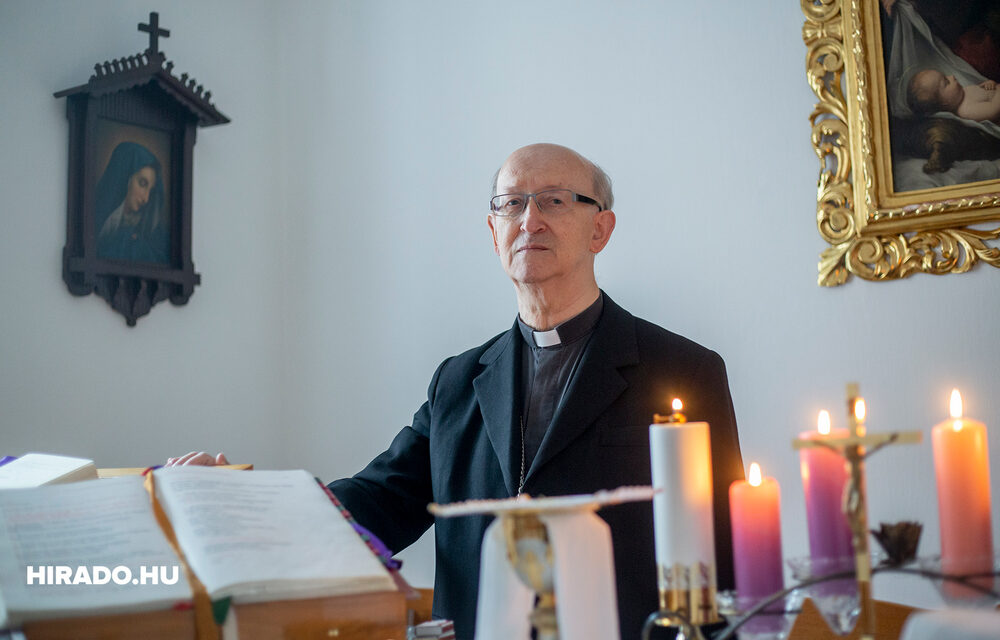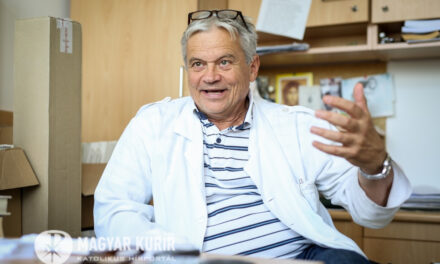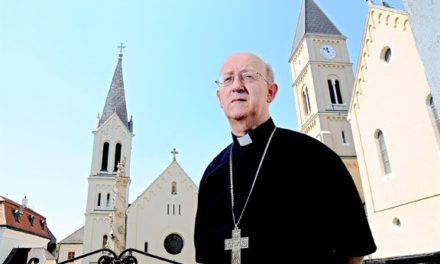"If our everyday lives are spent fighting with others, we lose not only God, but also ourselves"
Gyula Márfi believes that the Church is now in its declining period. But pessimism does not flow from the words of the former archbishop of Veszprém, because we also learn from him that the betrothed of Christ has been secularized by fallen people several times over the years, but the saints were always able to guide him back to the right path. The Catholic high priest tries to live an active life even in retirement, but he is glad that he can pray more attentively lately, and in the meantime he even had time to watch the football World Cup matches.
- We will soon celebrate Christmas 2022 (the interview was recorded by hirado.hu before the fourth Sunday of Advent - author's note). But even before that, as always, we spend our time waiting. I mean, let's try. I have not lived in a different age, but I feel as if it has never been so difficult to put aside the insignificant things of everyday life in order to deal with eternity in the period before one of the biggest holidays of Christianity.
In the first centuries, Christians lived under the spell of eternity, while their lives were in constant danger. In the time of Peter and Paul, they were still waiting for the early second coming of Jesus. After the Christian persecution ended, people's thinking gradually became secular.
It is no coincidence that St. Benedict, the father of Western monasticism, fled into the wilderness and more and more people became hermits. They felt that they could no longer live out their faith in society.
It is true, later they also realized that loneliness is not real either, since it is not the will of Jesus. It was then that the monastic communities were founded, shaking up the Christians. Then the zeal of the faithful began to wane again, but there were always periods when saints appeared on the scene who brought the desire for the supernatural back into people's lives. The thirteenth century, for example, was such an age. Saint Francis of Assisi, Saint Anthony of Padua, Saint Bonaventure, Saint Dominic, Saint Thomas Aquinas, our Saint Elizabeth of Árpád House, Saint Clare, Saint Agnes of Prague and I could list them for a long time appeared. After them, a more ecclesiastical attitude began to prevail, but later we became secular again. It is no coincidence that the Reformation came in the sixteenth century, but not in the same way as before. It ended in a split. We Catholics are also responsible for this, even if, according to our conviction, a schism would not have been necessary to renew the faith, as this is supported by previous examples.
"And the later ones?"
After that, the church was renewed again. The members of the Carmelite order came with St. Teresa the Great, St. John of the Cross, St. Ignatius of Loyola, St. Francis Xavier, a little later St. Francis de Sales and many others who set an example, thanks to them, a more supernatural approach began to prevail again. I feel that nowadays the church is once again living its declining, decadent era, at least in Europe.
"How is the situation elsewhere?"
There are reports that
In Asia, especially in Japan, South Korea, or Africa, Christianity is growing stronger. In Europe, however, we really have to say that it is very much below itself.
Let me tell you a story that perfectly illustrates the extent of secularization in the old continent. About six years ago, as archbishop of Veszprém, I said three masses for Hungarians in and around Stuttgart. Among other things, I talked about the fact that the Lord Jesus was truly resurrected, as well as about the fact that there is a heaven, which has beautiful symbols in the Holy Scriptures. For example, father's house, paradise regained, garden of Eden, holy city, new heaven and new earth. After my sermon, the parish priest told me that he was glad that I talked about it, because nobody there is interested in it anymore. It doesn't matter to them whether Jesus was really born or not. They say "be born in me!". Or, “Who cares whether Jesus is risen or not? Rise up in me!".
"And heaven?"
How do they think it exists? It doesn't matter to them either. They say: "Let's create heaven here on Earth!".
- These were previously considered heretical movements. But the totalitarian dictatorships of the twentieth century also arose from this stem.
Today, the Christians themselves are downgrading the church to a public welfare institution, which does have an office dealing with environmental protection and a homeless hostel, which is very important and salutary, but its activities are limited to this extent. The church is thus separated from faith, and only love matters to it. Except
love without faith leads to dead ends and false paths. It distorts love.
We love the child so much that if he doesn't want to pray, then don't pray, and we don't even pray, so as not to hurt his feelings. He doesn't like to go to church, so let's not force him, we'd rather not go either, so that the poor guy doesn't feel bad about it. If he wants to do bad things, let him do bad things, because he has free will. I'll give another example. We must love homosexuals. So far, this is fine, since everyone is a child of God, but we don't have to love them the way lobbyists want to force us to, because it's not really love to praise their wrongdoings. That is why their marriage should not be blessed either. I say this because there are examples of this from other countries where the institution of gay marriage exists in civil law. Just as it has become customary to bless life partner relationships. Speaking of which, this also affects heterosexuals, in Germany there is also Lebensteilpartner, i.e. life partner, in addition to Lebenspartner, i.e. life partner. This is a disaster. It is not only a sin against God, but also against humanity, to whose destruction this attitude leads, or at least to the disappearance of Christianity.
- The Advent period is often already as if Christianity has disappeared.
It seems that the life of a person in the developed world really boils down to being able to eat, drink, sleep, constantly consume and buy something. This is what his anticipation of Advent is all about for him, he has no intention of being saved. You don't even think about it. That is why he becomes lonely.
I observed how much loneliness prevails in the literature of the twentieth century, which is an even more widespread problem today.
In the prophecy of the prophet Isaiah, he called the savior Emmanuel, which means God is with us. Without Jesus, we become lonely, God is not with us. Sooner or later everyone will be touched by the breath of death, but those who said no to Jesus will not find anyone they can turn to then.
- Many believers experience that everyday struggles, such as defending themselves against unbelievers who attack them, or even differences of opinion with their Christian brothers distract them, and they do not spend enough time in silence. It is as if they are afraid that if they do not fight the actual battles of everyday life, they will lose eternal life.
This is completely upside down logic. If our everyday lives are spent fighting with others, then we lose not only God, but also ourselves. It is impossible to be happy like this.
- He mentioned that Christianity is growing in Africa. Cardinal Robert Sarah of Guinea argued in a book that for Christians who are tired of faith, suffering from spiritual dryness, and for the Church experiencing a crisis, holidays like Christmas are a great opportunity to rekindle the flame of faith. This is not a new discovery, but the Cardinal thought it important to emphasize it. Do we really have to go all the way to Africa to hear these ancient wisdoms?
It is surely no coincidence that Sarah, an African cardinal, thinks in the most supernatural way among the current high priests of our Church. One would almost want to exclaim out loud: finally a cardinal who speaks in a truly Christian way and does not just say that we should love each other children!
"The first great Christian renewal can be linked to the establishment of Western monasticism," he said just now. Would it be worth rediscovering the wisdom of the monks?
Today, for many Christians, orders only mean delicious artisanal jams, beers, and social activities. Of course
monastic communities could teach everyday believers a lot about how to search for God and, if we have found it, how to worship it correctly so that our lives will be enriched.
Why the spiritual knowledge of monks, especially contemplative orders, is unknown to many, has its roots going back a long way in this country. II. Emperor Joseph, the hatted king, considered contemplative orders to be completely unnecessary and abolished all of them, or forced them to carry out some socially useful activity, in his opinion. Since then, the monastic orders have tried to carry out many activities that are recognized by the world. Of course, they created very good things in this spirit, but the point should be observation. By the way, Christmas is also a holiday of silence. At such times, we have to be quiet, we have to go deep into ourselves, so that we can experience that God has come close to us in Jesus. We have to talk about our lives with him, don't just run around mindlessly!
"Father Archbishop, how has he been spending his time since he retired?"
Even though I am already retired, Bishop János Székely of Szombathely and his deputy, Father István Császár, occasionally ask me for a task. For example, I recently said the reflection in the psalm on the Martyr's Day in Szombathely. In the past few weeks, we commemorated the martyr priest János Brenner, on the occasion of which I also delivered the sermon. The other day I went to a meeting with former Benedictine students, I felt that it was my place to say a few kind words to the younger ones, but also to those with whom we went to the Benedictines in Győr and Pannonhalm at the same time.
"According to them, he's not bored."
No, I'm very happy about these opportunities, as well as what
it is especially important during the Advent season that I have more time for prayer. I can perform the psalms more attentively and I am able to go deeper than when I was an archbishop.
I also pray at least five tenths of the rosary every day. I also deal a lot with theological issues. Already after my retirement, I wrote a book entitled Notes on Islam - with a Christian eye. I am working to re-release it with minor modifications. I am also planning to republish an older book of mine, the paths of the search for God, with a friend. I will also write new articles in it, and I will remove some from it. Then I just finished a study, which I gave the title "For the attention of Bible readers". This is not a scientific text, I want to guide beginner readers of the Holy Scriptures to read the word of God correctly. I want to convince them that the moral teaching of the Bible must be interpreted as a whole, and that individual books must be placed in their own time and read in its light.
"Would you give me an example?"
Here is a very well-known one: the Lord's Prayer, the Lord's Prayer. The Bible reader must understand how big a deal it was when Jesus allowed us to call the Creator our father. At the time when the Gospels were written, this kind of image of God was unimaginable, and among Muslims, anyone who calls Allah that way is still playing with his life.
The full interview HERE .
Cover photo: retired Archbishop Gyula Márfi 09.12.2022. photo: Hirado.hu/Gyula Péter Horváth












